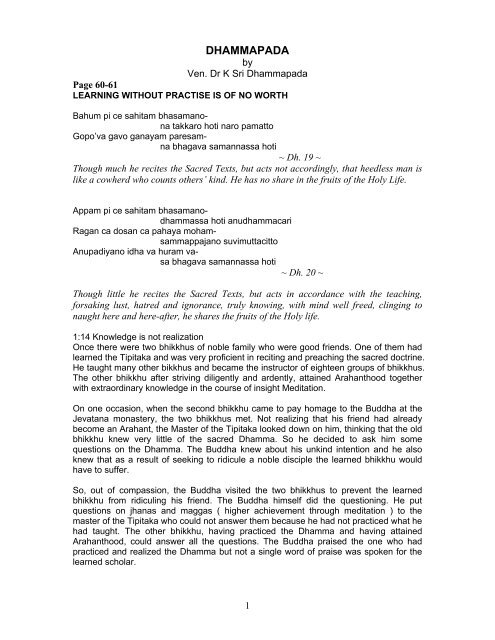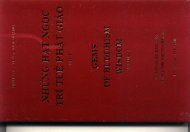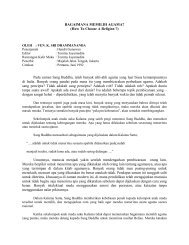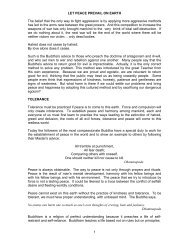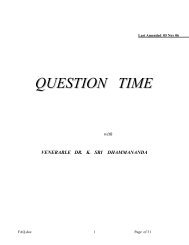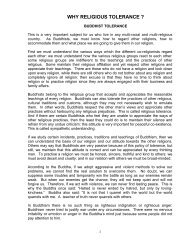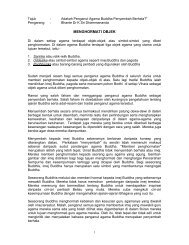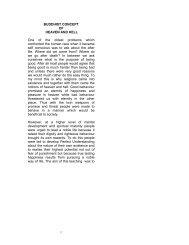Dhammapada - edited.pdf - Ven Dr K Sri Dhammananda
Dhammapada - edited.pdf - Ven Dr K Sri Dhammananda
Dhammapada - edited.pdf - Ven Dr K Sri Dhammananda
Create successful ePaper yourself
Turn your PDF publications into a flip-book with our unique Google optimized e-Paper software.
DHAMMAPADA<br />
by<br />
<strong>Ven</strong>. <strong>Dr</strong> K <strong>Sri</strong> <strong>Dhammapada</strong><br />
Page 60-61<br />
LEARNING WITHOUT PRACTISE IS OF NO WORTH<br />
Bahum pi ce sahitam bhasamano-<br />
na takkaro hoti naro pamatto<br />
Gopo’va gavo ganayam paresam-<br />
na bhagava samannassa hoti<br />
~ Dh. 19 ~<br />
Though much he recites the Sacred Texts, but acts not accordingly, that heedless man is<br />
like a cowherd who counts others’ kind. He has no share in the fruits of the Holy Life.<br />
Appam pi ce sahitam bhasamano-<br />
dhammassa hoti anudhammacari<br />
Ragan ca dosan ca pahaya moham-<br />
sammappajano suvimuttacitto<br />
Anupadiyano idha va huram va-<br />
sa bhagava samannassa hoti<br />
~ Dh. 20 ~<br />
Though little he recites the Sacred Texts, but acts in accordance with the teaching,<br />
forsaking lust, hatred and ignorance, truly knowing, with mind well freed, clinging to<br />
naught here and here-after, he shares the fruits of the Holy life.<br />
1:14 Knowledge is not realization<br />
Once there were two bhikkhus of noble family who were good friends. One of them had<br />
learned the Tipitaka and was very proficient in reciting and preaching the sacred doctrine.<br />
He taught many other bikkhus and became the instructor of eighteen groups of bhikkhus.<br />
The other bhikkhu after striving diligently and ardently, attained Arahanthood together<br />
with extraordinary knowledge in the course of insight Meditation.<br />
On one occasion, when the second bhikkhu came to pay homage to the Buddha at the<br />
Jevatana monastery, the two bhikkhus met. Not realizing that his friend had already<br />
become an Arahant, the Master of the Tipitaka looked down on him, thinking that the old<br />
bhikkhu knew very little of the sacred Dhamma. So he decided to ask him some<br />
questions on the Dhamma. The Buddha knew about his unkind intention and he also<br />
knew that as a result of seeking to ridicule a noble disciple the learned bhikkhu would<br />
have to suffer.<br />
So, out of compassion, the Buddha visited the two bhikkhus to prevent the learned<br />
bhikkhu from ridiculing his friend. The Buddha himself did the questioning. He put<br />
questions on jhanas and maggas ( higher achievement through meditation ) to the<br />
master of the Tipitaka who could not answer them because he had not practiced what he<br />
had taught. The other bhikkhu, having practiced the Dhamma and having attained<br />
Arahanthood, could answer all the questions. The Buddha praised the one who had<br />
practiced and realized the Dhamma but not a single word of praise was spoken for the<br />
learned scholar.<br />
1
The resident disciples could not understand why the Buddha had words of praise for the<br />
old bhikkhu and not for their learned teacher. The Buddha explained the matter to them<br />
by saying that the learned bhikkhu who knows a great deal but does not live in<br />
accordance with the Dhamma is like a cowherd, who looks after the cows for wages,<br />
while the one who practices Dhamma is like the owner who enjoys the five kinds of<br />
produce of the cows. Thus, the scholar enjoys only the services rendered to him by his<br />
pupils but not the benefit of Sainthood. The other bhikkhu, though he knows little and<br />
recites only a little of the Dhamma, having clearly comprehended the essence of it and<br />
having practiced it diligently, has eradicated craving, ill-will and ignorance. His mind<br />
being totally freed from mental defilements and from all attachments of this world as well<br />
as to the next he truly reaps the benefits of Sainthood or Perfection.<br />
Page 99-101<br />
Citta Vagga<br />
Mind<br />
STRAIGHTEN YOUR FICKLE MIND<br />
Phandanam capalam cittam-<br />
durakkham dunnivarayam<br />
Ujum karoti medhavi-<br />
usukaro’ va tejanam<br />
~ Dh. 33 ~<br />
The flickering, fickle mind, difficult to guard, difficult to control- the wise person<br />
straightens it as a fletcher straightens an arrow.<br />
Varijo’va thale khitto-<br />
Okamokata ubbhato<br />
Pariphandati idam cittam-<br />
Mara dheyyam pahatave<br />
~ Dh. 34 ~<br />
Like a fish that is drawn from its watery abode and thrown upon land, even so does this<br />
mind flutter. Hence should the realm of the passions be shunned.<br />
III:1 Meghiya who could not control his mind<br />
On one occasion, on his return from his alms round, the <strong>Ven</strong>erable Meghiya noticed a<br />
pleasant and beautiful mango grove, which he thought was an ideal spot for meditation.<br />
He asked the Buddha’s permission to let him go there.<br />
At first the Buddha asked him to wait for some time knowing that simply liking another<br />
place would not help him in his meditation. Meghiya was in a hurry to go and so he<br />
repeated his request again and again, until finally the Buddha allowed him to go.<br />
Thus, Meghiya set out for the mango grove, sat at the foot of a tree and practised<br />
meditation. He stayed there the whole day, but his mind kept wandering and he made no<br />
progress. He returned in the evening and reported to the Buddha how all the time he<br />
was assailed by thoughts associated with all sorts of mental defilements and<br />
disturbances.<br />
2
The Buddha admonished him that as the mind is easily excitable and fickle, one should<br />
control one’s mind in a proper manner wherever one is.<br />
Reflecting mindfully on the admonition given by the Buddha, Meghiya attained the first<br />
stage of Sainthood.<br />
CONTROL YOUR MIND<br />
Dunniggahassa lahuno-<br />
Yatha kama nipatino<br />
Cittassa damatho sadhu-<br />
Cittam dantam sukhavaham<br />
~ Dh. 35 ~<br />
The mind is difficult to control; swiftly and lightly, it moves and lands wherever it pleases.<br />
It is good to tame the mind, for a well-tamed mind brings happiness.<br />
III:2 The lady mind reader ( Matika Mata )<br />
Once, sixty bhikkhus, after each obtain a subject of meditation from the Buddha, went to<br />
a village at the foot of a mountain. There, Matika Mata, mother of the village headman,<br />
offered them alms food; she also built a shelter for them, so that they could stay in the<br />
village during the rainy season. One day, she requested the bhikkhus to teach her<br />
meditation. They taught her how to meditate on the thirty-two constituents of the body<br />
leading to the awareness of the decay and dissolution of the body. Matika Mata<br />
practiced with diligence and attained the third stage of Sainthood together with<br />
extraordinary knowledge and mental powers, even before the bhikkhus did.<br />
With the Divine Power of Sight ( Dibbacakkhu ) she saw that the bhikkhus had not<br />
attained Insight. She also learned that these bhikkhus had enough potential for the<br />
attainement of Arahanthood but that they needed proper food because a weak body will<br />
not allow the mind to function at its best. So, she prepared nutritious food for them . With<br />
nutritious food and right effort, the bhikkhus developed right concentration and<br />
eventually attained Arahanthood.<br />
At the end of the rainy season, the bhikkhus returned to the Jetavana monastery, where<br />
the Buddha was in residence. They reported to the Buddha that all of them were in good<br />
health and in comfortable circumstances and that they did not have to worry about food.<br />
They also mentioned Matika Mata who had been aware of their thoughts and had<br />
offered them the very good food that was necessary to keep them in good health which<br />
is important for proper concentration.<br />
A certain bhikkhu hearing about Matika Mata, decided that he too will go to the village.<br />
So, taking a subject of meditation from the Buddha he arrived at the village monastery.<br />
There, he found that everything he wished for was sent to him by Matika Mata. When he<br />
wishes for some food she personally came to the monastery, bringing along choice food<br />
with her. After taking the food, he asked her if she really could read the thoughts of<br />
others, but she evaded his question and replied, ‘People who can read thoughts of<br />
others behave in such and such a way.’ Then the bhikkhu thought, ‘If I, like an ordinary<br />
worldling, should entertain any impure thoughts, and if she can really read thoughts, she<br />
is sure to think ill of me.’ He, therefore became afraid of the lay devotee and decided to<br />
return to the Jetavana monastery. He told the Buddha that he could not stay in Matika’s<br />
village because he was afraid that the lay devotee might detect impure thoughts in him.<br />
3
The Buddha then advised him to observe just one thing, that is, to control his mind. He<br />
also advised him to return to the village and not to think of anything else but the object of<br />
his meditation. The bhikkhu returned and Matika Mata offered him nutritious food as she<br />
had done to the others before, so that he might be able to practise meditation without<br />
worry. Within a short time, he too purified his mind and attained Arahanthood.<br />
Page 139-141<br />
DO MUCH GOOD<br />
Yatha’pi puppha rasimha-<br />
Kayira malagune bahu<br />
Evam jatena maccena-<br />
Kattabbam kusalam bahum<br />
~ Dh. 53 ~<br />
As from a heap of flowers many a garland is made, even so many good deeds should be<br />
done by one subject to birth and death.<br />
IV: 8 The most devout lady ( Visakha )<br />
Visakha was the daughter of a rich man of Bhaddiya named Dhananjaya and his wife<br />
Sumana Devi, and the grand daughter of Mendaka, one of the five extremely wealthy<br />
men of King Bimbisara’s kingdom. When Visakha was very young, the Buddha came to<br />
Bhaddiya. On that occasion, the rich man Mendaka took Visakha and her companions<br />
with him to pay homage to the Buddha. After hearing the discourse given by the Buddha,<br />
Visakha, her grandfather and all her companions attained the first stage of Sainthood.<br />
When Visakha came of age, she married Punnavaddhana, son of Migara, a rich man in<br />
Savatthi. On the day of her marriage, her father Dhananjaya gave Visakha ten<br />
admonitions to observe as a dutiful wife. The admonitions are:-<br />
1) Do not carry the indoor fire outside<br />
2) Do not carry the outdoor fire inside<br />
3) Give only to those that give<br />
4) Do not give to those that do not give<br />
5) Give both to those that give and do not give<br />
6) Sit happily<br />
7) Eat happily<br />
8) Sleep happily<br />
9) Tend to the fire<br />
10) Honour the household divinities<br />
The implied meaning is as follow:-<br />
1) Fire here signifies slandering. The wife should not speak ill of her husband and<br />
parents-in-law to others. Neither should their shortcomings nor household<br />
quarrels be reported elsewhere.<br />
2) A wife should not listen to the reports and stories of other households.<br />
3) Things should be lent only to those who return them.<br />
4) No article should be lent to those who do not return them.<br />
5) Poor relatives and friends should be helped even if they do not repay.<br />
6) A wife should stand and not remain sitting on seeing her parents-in-law. ( This<br />
admonition deals with the modesty of a woman and the respect that should be<br />
shown to elders like parents-in-law).<br />
4
7) Before taking her meal, a wife should first see to the needs of her parents-in-law<br />
and husband. She should see that the servants, too are well cared for.<br />
8) This does not mean that a wife should sleep as long as she likes. Before<br />
sleeping, a wife should see that all doors are locked, servants have performed<br />
their duties, and that parents-in-law and husband have gone to bed.<br />
9) Parents-in-law and husband should be regarded as fire. Deal as carefully with<br />
them as one deals with fire.<br />
10) Parents-in-law and husband are regarded as divinities.<br />
One day, while Migara was having his meal, a bhikkhu stopped for alms at his house<br />
but Migara completely ignored the bhikkhu. Visakha, seeing this, told the bhikkhu,’ I<br />
am sorry, <strong>Ven</strong>erable bhikkhu, my father-in-law only eats stale food.’ On hearing this,<br />
Migara was very angry and ordered her to leave the house. Visakha replied she<br />
would not leave the house. Instead she summoned for the eight elders who were<br />
sent by her father to accompany her and to advise her on any problems she might<br />
face in her new home. It was for them to decide whether she was guilty. When the<br />
elders came, Migara told them,’ Whle I was having my food in a gold bowl, Visakha<br />
said that I was taking stale food. For this offence, I ’m sending her away.’ Thereupon,<br />
Visakha explained as follows:’ When I saw my father-in-law completely ignoring the<br />
bhikkhu standing for almsfood, I thought to myself that since my father-in-law was<br />
not doing any meritorious deed in this existence, he was only eating the fruits of his<br />
past good deeds. So, I said ,’My father-in-law only eats stale food. Now Sirs, what do<br />
you think? Am I guilty?’<br />
The elders decided that Visakha was not guilty. Visakha then announced that she<br />
who had absolute and unshakeable faith in the Teaching of the Buddha could not<br />
stay where bhikkhus were not welcomed. She also said if she was not given<br />
permission to invite the bhikkhus to the house to offer almsfood and make other<br />
offerings, she would leave the house. Therefore, Migara granted her all her requests.<br />
The next day, the Buddha and his disciples were invited to the house of Visakha.<br />
When alms food was about to be offered, she invited her father-in-law to join her in<br />
offering the food; but he refused the invitation. When the meal was over, again she<br />
invited her father-in-law to join her in hearing the discourse to be given by the<br />
Buddha. Her father-in-law felt that he should not refuse for a second time. But his<br />
ascetics teachers, the Niganthas, would not let him go. However, they conceded that<br />
he could listen from behind a curtain. After hearing the Buddha’s discourse Migara’s<br />
good kamma ripened and he attained the first stage of Sainthood. He felt very<br />
thankful to the Buddha and also to his daughter-in-law. Being so thankful, he<br />
declared that henceforth Visakha would be like a mother to him, and Visakha came<br />
to be known as Migara Mata.<br />
Visakha gave birth to several sons and daughters. Visakha possessed an immensely<br />
valuable gem-encrusted cloak given by her father as a wedding present. One day,<br />
Visakha went to the Jetavana monastery. On arrival at the monastery, she found that<br />
her bejeweled cloak was too heavy. So, she took it off, wrapped it up in her shawl,<br />
and gave it to the maid to hold it and take care of it. The maid absentmindedly left it<br />
at the monastery. It was the custom for <strong>Ven</strong>erable Ananda to look after the things left<br />
by any of the lay disciples. Visakha sent the maid back to the monastery saying,’ Go<br />
and look for the bejeweled cloak but if Ananda has already found it and kept it in a<br />
place do not bring it back. I will donate the bejeweled cloak to the <strong>Ven</strong>erable monks'.<br />
But Ananda did not accept the offer. So, Visakha decided to sell the bejeweled cloak<br />
and donate the money. But as there was no one who could afford to buy the<br />
5
ejeweled cloak, Visakha bought it back herself. With this money, she built a<br />
monastery which came to be known as Pubbarama.<br />
After the merit offering ceremony she called all her family members and on that night<br />
she told them that all her wishes had been fulfilled and that she had nothing more to<br />
desire. Then, reciting some verses, she went round and round the monastery. Some<br />
bhikkhus hearing her, thought she was singing and reported to the Buddha that<br />
Visakha was not like before, and that she was going round the monastery, singing.<br />
‘Could it be that she has gone off her mind?’ they asked the Buddha. The Buddha<br />
explained, ‘Today, Visakha had all her wishes of the past and present existences<br />
fulfilled and on account of that sense of achievement she is feeling elated and<br />
contented. Visakha was just reciting some verses to express her happiness; she<br />
certainly had not gone off her mind. Visakha, throughout her previous existences,<br />
had always been a generous donor and an ardent promoter of the Doctrine.’<br />
The Buddha then revealed that Visakha in one of her past existences was born<br />
during the time of a previous Buddha by the name of Padumuttara Buddha. At that<br />
time, after admiring the qualities of her friend who was the chief female lay disciple<br />
and benefactress of Padumuttara Buddha, she had cherished a desire to possess<br />
those sterling qualities. So, after offering alms food to Padumuttara Buddha and his<br />
bhikkhus for seven days, she had made an earnest wish that she would one day be<br />
born as the chief female lay disciple and benefactress of a future Buddha.<br />
With his supernormal powers, Padumuttara Buddha looked into the future, and<br />
having determined that her earnest wish could be fulfilled, he confirmed that Visakha<br />
would be able to fulfill her wish. Also in one of her later existences, she also received<br />
the same assurance from Kassapa Buddha regarding her earnest wish.<br />
The Buddha concluded the discourse by saying that Visakha was strongly inclined to<br />
do good deeds and had done much good in her previous existences, just as an<br />
expert florist makes many garlands from a collection of flowers.<br />
Page 533-534<br />
Niraya Vagga<br />
Woeful State<br />
LIARS SUFER<br />
Abhuta vadi nirayam upeti-<br />
Yo capi katva na karomi’ti c’aha<br />
Ubho’pi te pecca sama bhavanti-<br />
Nihina kamma manuja parattha<br />
~ Dh. 306 ~<br />
One who tells lies (about others) goes to niraya (a woeful state); one who has done<br />
evil and says, ‘I didn’t do it,’ also goes to niraya. Both of them being evil doers,<br />
suffer alike (in niraya ) in their next existence.<br />
XXII:1 An evil plot against the Buddha ( Sundari )<br />
As the number of people revering the Buddha increased, some heretics found that<br />
the number of their following was dwindling. They had lost gain and honour, and no<br />
one knew whether they existed or not. Therefore they became very jealous of the<br />
6
Buddha. They were also afraid that things would get worse if they did not do<br />
something to destroy the reputation of the Buddha. So, they sent for a young woman<br />
called Sundari and said to her,’Sundari, you are a very beautiful and clever young<br />
lady. We want you to put Gotama Buddha to shame by making it appear to others<br />
that you are having an affair with him. By doing so, his honour will be destroyed, his<br />
followers will decrease and many will come to us. Make the best use of your looks<br />
and be crafty.’<br />
Sundari understood what was expected of her. Therefore, late in the evening, she<br />
went in the direction of the Jetavana monastery. When asked where she was going,<br />
she answered, ‘ I am going to visit Gotama. I live with him in the monastery.’ After<br />
saying this she proceeded to the place of the heretics. Early in the morning the next<br />
day, she would return home. If anyone asked her from where she had come, she<br />
would reply, ‘ I have come from the Jetavana monastery after spending the night with<br />
Gotama.’ She carried on like this for a few more days. Then the heretics hired some<br />
villains to kill Sundari and dump her body near the Jetavana monastery.<br />
The next day, the heretics spread the news of the disappearance of Sundari. They<br />
reported to the king who gave them permission to search where they wished. Finding<br />
the body near the Jetavana monastery, they reported, ‘ O king, the followers of<br />
Gotama have killed Sundari and have thrown her body near the Jetavana monastery<br />
to cover up the misdeed of their Teacher.’ The king replied, ‘In that case, you may go<br />
around the town and proclaim the fact.' So they went around the town carrying the<br />
dead body of Sundari, shouting, ‘ Look at what the followers of Gotama have done!<br />
See how they have tried to cover up the misdeed of Gotama!’ When informed that<br />
the heretics were trying to ruin his reputation and honour, the Buddha only said, ‘ My<br />
sons, you just tell them this: One who tells lies goes to hell; one who has done evil<br />
and says ‘ I did not do it ’also goes to hell. Both of them, being evil doers, suffer alike<br />
in hell and in their future existence.’<br />
The king then ordered his men to investigate the murder of Sundari. On investigation,<br />
they found that Sundari had died at the hands of some villains. When brought before<br />
the king, the villains admitted that they were hired by the heretics to kill Sundari and<br />
dump her body near the Jetavana monastery. The heretics were also brought before<br />
the king and they confessed their role in the murder of Sundari. The king then<br />
ordered them to go around the town and confess their guilt to the people. So they<br />
went around the town saying, ‘ We have falsely accused the disciples of Gotama just<br />
to bring disgrace on him. The disciples of Gotama are innocent, only we are guilty of<br />
the crime.’ The heretics and the villains were punished for the murder of Sundari. As<br />
a result of this episode, the glory and the good name of the Buddha were very much<br />
enhanced.<br />
Page 230-231<br />
BLESSED INDEED ARE THEY WHO HONOUR THOSE WORTHY OF HONOUR<br />
Abhivadanasilissa-<br />
Niccam vaddhapacayino<br />
Cattaro dhamma vaddhanti-<br />
Ayu vanno sukham balam<br />
~ Dh. 109 ~<br />
For one who is in the habit of constantly honouring and respecting the elders, four<br />
blessings increase- age, beauty, bliss, and strength.<br />
7
VIII: 8 How the Buddha protected a child ( Ayu Waddhana )<br />
Once, there were two hermits who lived together practicing religious austerities for<br />
many years. Later, one of them left the hermit life and got married. After a son was<br />
born, the family visited the old hermit and paid their respects to him. To the parents<br />
the hermit said, ‘ May you live long’, but he said nothing to the child. The parents<br />
were puzzled and asked the hermit the reason for his silence. The hermit told them<br />
that the child would live only seven more days and that while he himself did not know<br />
how to prevent his death, Gotama, the Buddha, might know how to do it.<br />
So the parents took the child to the Buddha. When they paid homage to the Buddha,<br />
he also said, ‘ May you live long ‘ to the parents only and not to the child. The<br />
Buddha also knew the impending death of the child. To prevent his death, the<br />
parents were told to build a pavilion at the entrance to the house, and put the child<br />
on a couch in the pavilion. Then some bhikkhus were sent there to chant the Parittas<br />
for seven days. On the seventh day, the Buddha himself came to the pavilion; the<br />
devas were also in attendance. At that time, an evil spirit was at the entrance, waiting<br />
for a chance to attack the child, but as more powerful devas arrived the demon had<br />
to step back and make room for them so that he had to stay at a place very far away<br />
from the child. That whole night, recitation of parittas continued, thus protecting the<br />
child. The next day, the child was taken up from the couch and made to pay respects<br />
to the Buddha. This time, the Buddha said, ‘ May you live long ’to the child. When<br />
asked how long the child would live, the Buddha replied that he would live up to one<br />
hundred and twenty years. So the child was named Ayu Waddhana.<br />
When the child grew up, he went about the country with his friends and fellow<br />
devotees. One day, they came to the Jetavana monastery, and the bhikkhus,<br />
recognizing him, asked the Buddha, ‘ For living beings, is there any means of gaining<br />
longevity?’To this question, the Buddha answered, ‘ By respecting and honouring the<br />
elders and those who are wise and virtuous, one would gain not only longevity but<br />
also beauty, happiness and strength.’<br />
Extracted From The Book : The <strong>Dhammapada</strong><br />
The Full Text is on Sale and can be obtained from:<br />
Buddhist Missionary Society<br />
Buddhist Maha Vihara<br />
123, Jalan Berhala, Brickfields<br />
50470 Kuala Lumpur<br />
Malaysia<br />
8


